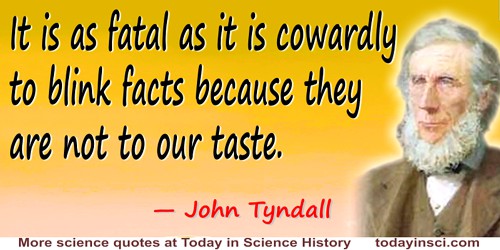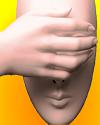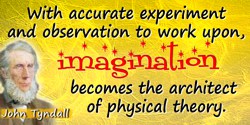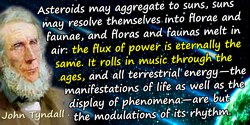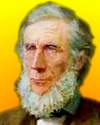 (source)
(source)
|
John Tyndall
(2 Aug 1820 - 4 Dec 1893)
Irish physicist who demonstrated why the sky is blue. He wrote on diverse topics, including crystals, glaciers and radiation. His studies also included spontaneous generation, the germ theory of disease and ozone.
|
John Tyndall
“Fatal…to blink facts”
Illustrated Quote - Medium (500 x 250 px)
More John Tyndall quotes on science >>
More quotes on Facts >>
This statement by the 19th century physicist, John Tyndall, would be very applicable in the present time to the denial of climage change. It appears in the chapter 'Science and Man' in a collection of his essays, Fragments of Science published in 1879. The chapter comes (footnoted as “with additions”) from his Presidential Address to the Birmingham and Midland Institute on 1 Oct 18777.
The quote appears as part of a rather philosophical discussion, and further mention of the context is omitted here, as it does not expand the quote with interesting examples similarly applied to important disputed facts, like say, climate change.
It should be noted that several other examples of the use of the expression to “blink facts” can be found in books through the period about 1850-1930. It means “to refuse to recognize or face facts.”
A similar idea was expressed by the editor in his 'Foreword' to Sinclair's Magazine (1918) when he wrote:1
“To blink facts is as safe as to fight blindfolded.”
1 By Glen B. Winship, editor, in 'Foreword', Sinclair’s Magazine (Sep 1918), 2, No. 2, 1.
- Science Quotes by John Tyndall.
- 2 Aug - short biography, births, deaths and events on date of Tyndall's birth.
- John Tyndall - context of quote “Fatal…to blink facts” - Large image (800 x 400 px)
- John Tyndall - context of quote “The First Experiment a Child Makes” - Medium image (500 x 250 px)
- John Tyndall - context of quote “The First Experiment a Child Makes” - Large image (800 x 400 px)
- On Matter and Force - John Tyndall’s Lecture to general public at Dublin (1867).
- A Vision of Modern Science: John Tyndall and the Role of the Scientist in Victorian Culture, by Ursula DeYoung. - book suggestion.
